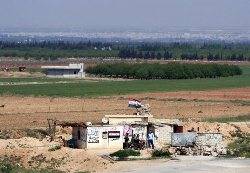Six children are among at least 57 people killed in southern Syria after the regime’s army launched an all-out assault on two towns in Deraa province, according to a London-based activist group.
The Syrian Observatory for Human Rights (SOHR) identified the towns on Thursday as Sanamin and Ghabagheb.
"At least six children, seven women, 16 opposition fighters, 16 other unidentified men and 12 regime troops were killed on Wednesday, in fighting, shelling and summary executions waged after the regime’s army launched an assault on Sanamin and Ghabagheb," the SOHR said.
Al Jazeera's Bernard Smith, reporting from Istanbul in neighboring Turkey, said the raid in which 45 people reportedly died in Sanamin, about 50km south of Damascus, was precipitated by a rash of defections by members of the Syrian army.
"So, a day later, the Syrian regime army had gone into this area to try and find these soldiers, perhaps try and kill them to stop them from giving intelligence to the opposition but also as a warning, to ... [other] soldiers, that if they consider defection, then this is what's going to happen to them," he said.
"But of course, as we see on daily basis, caught up in these battles are civilians as well."
Lebanese town hit
In another development on Thursday, Syria's regime air force attacked a rural area near the town of Arsal in eastern Lebanon for the second time in 24 hours, Lebanese officials said.
"I can confirm there was a raid," Ahmad Fliti, deputy head of the council in the majority Sunni Muslim town in northeastern Lebanon, told the AFP.
"Several ambulances travelled immediately to the affected area to transfer the wounded to clinics and hospitals."
A security official confirmed reports of the attack, and a Lebanese Red Cross said the organization took four wounded away from the scene.
The raid came a day after Syrian regime jets bombed Sarjal Ajram, the same area that was struck on Thursday.
The cross-border raids occurred as a prominent rights monitor said Syrian military air strikes have hit bakeries and hospitals among other civilian targets and killed thousands of people in raids that it said amount to war crimes.
"Individuals who commit serious violations of the laws of war willfully, that is intentionally or recklessly, are responsible for war crimes," Human Rights Watch (HRW) said on Thursday in a report titled Death from the Skies.
Bakeries targeted
Basing its findings on investigations in opposition-held areas of three war-torn provinces, the New York-based HRW documented air strikes on four bakeries and two hospitals, along with other civilian targets.
One hospital in the northern city of Aleppo, the Dar al-Shifa, suffered at least four attacks alone.
"In village after village, we found a civilian population terrified by their country's own air force," Ole Solvang, a Human Rights Watch emergencies researcher, said.
Citing a network of activists, HRW said that "air strikes have killed more than 4,300 civilians across Syria since July 2012."
The report detailed the use of highly explosive munitions that sometimes flattened several houses in a single attack.
Fragmentation bomb
One resident of the northern town of Azaz told HRW that at least 12 members of his family were killed in a bombing of their homes on August 15 last year.
One of the explosive devices used in attacks on Azaz was a powerful fragmentation bomb "that has a casualty-producing radius of 155 meters", HRW said.
Other types of munitions used by the Syrian army were cluster bombs, ballistic missiles and incendiary weapons, HRW said.
Syria responded to the HRW report by accusing foreign organizations of being biased in favor of opposition fighters.
Without naming the group, Syrian state television said on Thursday that foreign organizations rely only on accounts by opposition activists when reporting about the conflict.
PHOTO CAPTION
Syrian soldiers at a Syrian army post as seen from the Lebanese border village of al-Qasr, Lebanon, Friday, April 12, 2013.
Al-Jazeera


 Home
Home Discover Islam
Discover Islam Quran Recitations
Quran Recitations Lectures
Lectures
 Fatwa
Fatwa Articles
Articles Fiqh
Fiqh E-Books
E-Books Boys & Girls
Boys & Girls  Articles
Articles










